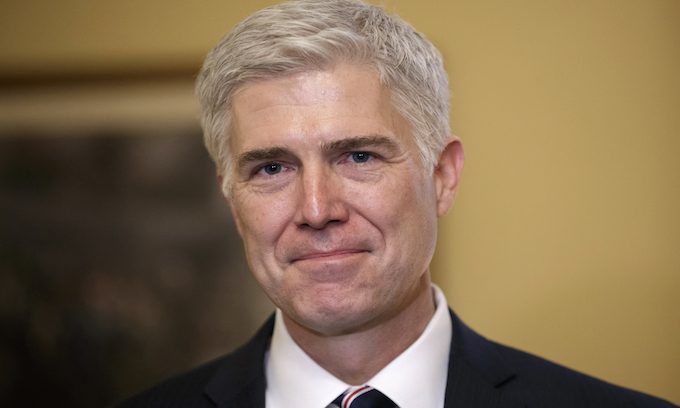When there is a conflict between the Executive Branch and the Legislative Branch of American government, what is the role of the Judicial Branch? That was a question Tuesday on “Fox & Friends” for Supreme Court Associate Justice Neil Gorsuch.
“… When it comes to the role of the judiciary, I believe that the role is to be faithful to the original meaning of the Constitution,” Gorsuch (pictured) said. “I tell my law clerks [that] I have just two rules. Rule number one: don’t make things up.”
Rule number two, he continued, is: “When you’re in doubt, when everybody is yelling at you, begging you to do this or threatening you if you do that, refer back to rule number one.”
Gorsuch, the first Trump appointee to the high court, went on to say that “originalism” is badly understood – and a bit of a misleading name.
“Folks who disagree with [originalism] sometimes call themselves ‘living constitutionalists,'” he described. “Well, who wants a dead Constitution? I don’t. I want an enduring Constitution – and the idea of originalism is just simply that judges should follow the original meaning of the words on the page and neither add things that aren’t there nor take away things that are there. And I worry that both of those things happen when we depart from the original meaning of the Constitution.”
Gorsuch pointed to the Dred Scott decision as an example. “The first time the Supreme Court … really departed from the original meaning of the Constitution was perhaps in Dred Scott when the court found a right for white persons to own black persons as slaves in the territories of the United States,” he said.
“Scour the document as long as you want – you will not find that right there. They made it up,” he added.
<iframe width=”560″ height=”315″ src=”https://www.youtube.com/embed/poAT2EERAW4″ frameborder=”0″ allow=”accelerometer; encrypted-media; gyroscope; picture-in-picture” allowfullscreen></iframe>
Gorsuch cited the Sixth Amendment as another example. That amendment guarantees American citizens the right to confront their accusers in any case brought against them.
“For years, the Supreme Court of the United States said, ‘No, we’re not going to enforce that right, except for when we think it’s really important,'” explained the associate justice. “Originalism says no to both of those things. It says we’re not going to add things [and] we’re not going to take things away.
“A judge’s job is to be faithful to the Constitution at all times – nothing more, nothing less,” he concluded.
—-
Copyright American Family News. Reprinted with permission.



















Recent Comments